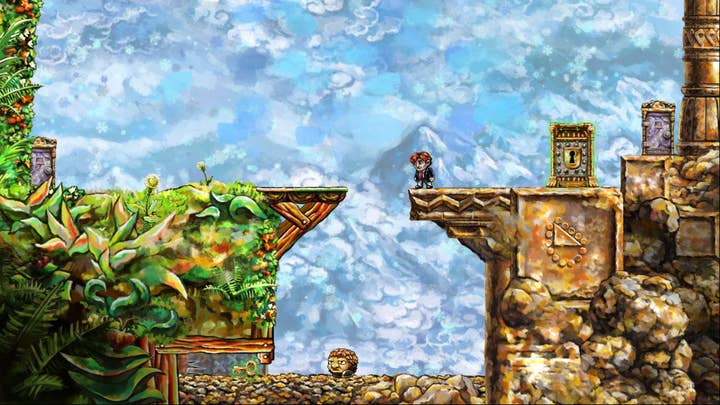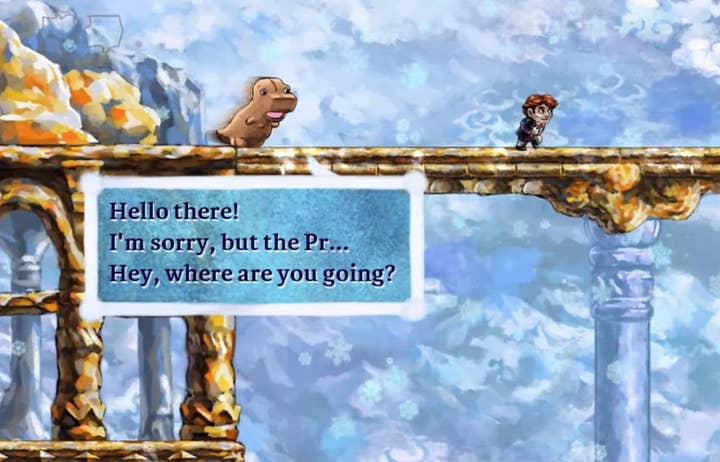Braid and the beauty of not wasting time
Why I Love: A Duel Hand Disaster dev Jaycee Salinas takes inspiration from the indie time manipulation platformer
Why I Love is a series of guest editorials on GamesIndustry.biz intended to showcase the ways in which game developers appreciate each other's work. This entry was contributed by Jaycee Salinas of Ask an Enemy Studios (El Paso, TX) - the indie developer behind A Duel Hand Disaster: Trackher that is now available through Steam and Nintendo Switch.
Back when A Duel Hand Disaster: Trackher was just a twinkle in my eye and game development was more of a hope than an actual goal, I had no idea where to start but I sure as hell knew it was possible. Hey, I watched Indie Game: The Movie.
I held no illusions though. I knew it wouldn't be easy. Not in the least. Even more so because I was going to take on this endeavor on my own with no prior programming or game design experience whatsoever. Oddly enough, instead of reflecting on my "game design" college education -- mostly because it was a complete waste of time -- I took a different approach and looked back fondly and intently on a game that I found extremely interesting on a myriad of fronts. That game was Braid.

Braid is a masterclass in game design. Allow to me to qualify and emphasize that "especially if you plan on making a game on your own." I'm referring specifically to the design. I have nothing but respect for the team Jonathan Blow put together towards the end of development. It's something I always point out to people who want to make games. If you plan on making a game on your own, focus on your weaknesses. Your strengths are your strengths for a reason. If you feel like your art is weak hire someone who can deliver on your vision, or even better, expand on it like David Hellman did here.
"For a game that focuses on time (and time manipulation), it never once feels like it's wasting yours"
To hammer in on this idea, my motto has always been gameplay first ask questions later. I never hide the fact that ADHD looked like absolute ass when I started it as a pixel art game, but I sucked it up and carried on. I'm also a musician first and foremost and while the quality of my music is entirely subjective, my ability to write it is undeniably objective. Focus on the task at hand. If you have a team delegate accordingly. If you're like me and a team is out of the question you have two options. Own it and move on or whine and give up. Glass half full. Always and without question.
This game never treats the player like a child with its gameplay, it most certainly never forces its narrative down your throat, and most importantly, it's a great example of a game that executes on scope. When you are going it alone, this is the most important lesson you need to learn, and there's a lot to learn from playing through Braid. If you read as much into it as I did, it'll teach you a hell of a lot more than it initially lets on.
For a game that focuses on time (and time manipulation), it never once feels like it's wasting yours. Each level along with its corresponding mechanic is self-contained and never requires any backtracking, or overwhelming overworld map. There's no fumbling through menus to level up different power ups and you'll never have to compare the stats of multiple weapon sets or load outs. It's an approach that I'm not sure is given much credit.
For a game to execute on scope with this level of engagement from the player is nothing short of amazing. It's not trying to fit a mold. It knows what it is and doesn't try to overcompensate. Most importantly, the only thing holding you back from progression is your willingness to admit defeat in the battle, but most definitely not the war. It makes you question everything, doesn't allow you to “get away with it,” and ultimately forces you to answer it all.
"Patience and determination are the only thing standing between you and the controller you are about to smash into your face"
The following is extremely subjective, but what is good art if not a subjective concoction of bad ideas that result in beautiful disasters? The game's theme, gameplay and lore combined, feel like a constant effort at getting the player to deal with regret by throwing you into a trial by fire. If you can't learn from your mistakes, then regret will turn into resentment, which is a dark path for anyone to head down. This feels, unscientifically of course, as a way to learn how to cope with that thanks in no small part to the feeling of accomplishment one gets after resolving the situation.
The character named Tim, which I can't help but imagine was a play off of the word time, is constantly being told the princess is in another castle. At one point you rush by the dinosaur character that gives you this dialogue, interrupting him, and demonstrating Tim's stubborn inability to let things go and move on. It is a game about time after all.

Breaking with convention it consciously subverts the expectation that what you are trying to accomplish is impossible by brilliantly removing the fail state that most platformers -- and dare I say most video games -- are known for. It's an oversimplified approach that seems wildly obvious, but only after you take its unconventional purpose for granted. Instead of Tim "dying" when you make a mistake, time just stops. You are required to rewind and see what you did wrong, frame by frame, and then apply yourself differently.
In almost any other video game, a death would result in a game over screen that would require a reload of the level or checkpoint. If it happens to be a rogue-like (which let's face it, it probably would be), it would require you to repeat the last 20 minutes, if not more, of redundant gameplay, whereas Braid lets you instantly fix the fuck up and move on. Patience and determination are the only thing standing between you and the controller you are about to smash into your face. It's rewarding though. I promise.
This whole thing dramatically crescendos into the game's final level. I will not spoil it for you here since it's definitely worth the playthrough to see for yourself. I will say this though you do start on World 2 for a reason.
I took all these lessons and those from another game called Brothers: A Tale of Two Sons into my journey creating A Duel Hand Disaster: Trackher. Whether or not I successfully implemented them is a story for another day, but I sincerely hope that players will understand the theme I put forth in ADHD. I purposefully, and indirectly, placed the book at the outer edge for those who seek it.
In the meantime, I'll continue the push of getting people out of their comfort zone, as Braid did with me, in pursuit of their own subconscious desire to achieve the best possible outcome of any endeavor. All the while understanding that the decisions you make must be owned, and the lessons you learn will sometimes come to you by the most unconventional means.
Developers interested in contributing their own Why I Love column are encouraged to reach out to us at news@gamesindustry.biz.